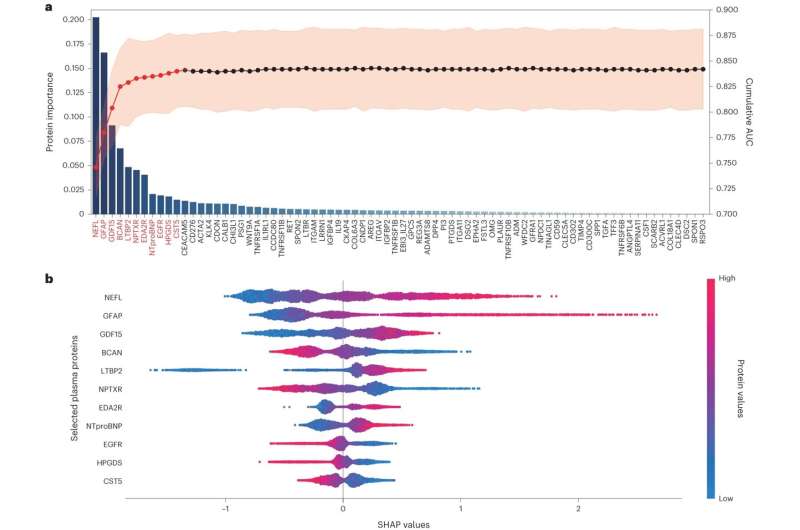This article has been reviewed according to Science X's editorial process and policies. Editors have highlighted the following attributes while ensuring the content's credibility:
fact-checked
peer-reviewed publication
trusted source
proofread
Protein biomarkers predict dementia 15 years before diagnosis, according to new study

In the largest study of its kind, scientists have shown how protein "biomarkers" predict dementia 15 years before diagnosis.
The research shows how profiles of proteins in the blood accurately predict dementia up to 15 years prior to clinical diagnosis. These are known as biomarkers, which are molecules found in blood, other body fluids, or tissues that indicate a normal or abnormal process or a condition or disease.
In the study, scientists from The University of Warwick and Fudan University, Shanghai, used the largest cohort of blood proteomics and dementia to date, including blood samples from 52,645 healthy participants recruited from UK Biobank—a population-based study cohort.
Blood samples collected between 2006 and 2010 were frozen and then analyzed 10–15 years later by the research team, who analyzed them between April 2021 and February 2022. Until March 2023, a total of 1,417 participants went on to develop dementia—and these people's blood showed dysregulation of protein biomarkers.
Of 1,463 proteins analyzed, aided by machine learning, 11 proteins were identified and combined as a protein panel, which the researchers have shown to be highly accurate at predicting future dementia. Further incorporation of conventional risk factors of age, sex, education level, and genetics showed for the first time the high accuracy of the predictive model, measured at over 90%, indicating its potential future use in community-based dementia screening programs.
Proteins (for example Glial Fibrillary acidic protein, GFAP) had previously been identified as potential biomarkers for dementia in smaller studies, but this new research was much larger and conducted over several years. Known as a longitudinal analysis (a study conducted on a sample of participants over a number of years), the researchers were able to show the differences and trajectories between those with dementia and controls across 15 years.
An early diagnosis is critical for those with dementia. New drug technology can slow or even reverse the progress of Alzheimer's, but only if the disease is detected early enough. The drug lecanemab is one of two new treatments for the disease.
Lead author Professor Jianfeng Feng, from the Department of Computer Science, University of Warwick, hopes future drugs may be developed to interact with the proteins identified in the study.
Professor Feng emphasized that combining artificial intelligence and protein analysis offers a promising avenue for precision medicine. This is highly important for screening middle-aged to older individuals within the community who are at high risk of dementia. "This model could be seamlessly integrated into the NHS and used as a screening tool by GPs," said Professor Feng.
Professor Wei Cheng, a co-corresponding author from Fudan University, explained that this research builds on the team's previously developed dementia prediction model, which used variables such as age, the presence of a certain gene, and the mother's age at death. "Compared to our previous work, the newly developed protein-based model is obviously a breakthrough," he said.
Another corresponding author, Professor Jintai Yu, a neuro-vegetative disease specialist from Fudan University, added, "The proteomic biomarkers are more easily to access and non-invasive, and they can substantially facilitate the application of large-scale population screening."
He also pointed out the drawbacks of previous risk models, which primarily depended on intricate and difficult-to-obtain biomarkers using procedures such as lumbar puncture or complex imaging methods, meaning their widespread use is hindered because of the invasive procedures and the high cost of carrying them out.
The findings are published in the journal Nature Aging.
More information: Jian-Feng Feng, Plasma proteomic profiles predict future dementia in healthy adults, Nature Aging (2024). DOI: 10.1038/s43587-023-00565-0. www.nature.com/articles/s43587-023-00565-0



















